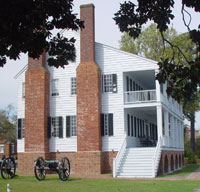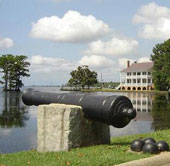
Edenton Tea Party Chapter
National Society Daughters of the American Revolution
Edenton, North Carolina
History

Barker House

Edenton Teapot
Photos above courtesy Chowan County
Tourism Development Authority

Iredell House
Photo courtesy of Wikimedia
The Edenton Tea Party Chapter, NSDAR, was chartered on February 27, 1948. The chapter’s name commemorates the protest of fifty-one ladies against the British injustices of 1774. This incident was one of the first instances of women participating in political activity in the colonies. The Barker House was the home of Penelope Barker (1728-1796), the reputed leader of the 1774 Edenton Tea Party. In 2003, the North Carolina Society Daughters of the American Revolution (NCSDAR) Centennial Quilt (the theme of which was the Edenton Tea Party) was placed in the Barker House on permanent display to commemorate the event.
At the first regular chapter meeting on April 30, 1948, the members voted to acquire and restore the home of James Iredell — an Attorney General for North Carolina and a President George Washington appointee as an Associate Justice to the first United States Supreme Court. The women signed bank notes to make this acquisition a reality, and to allow for the preservation of one of Edenton’s most important residences. The Iredell House is carefully maintained and is one of twenty-three historic sites across the state.
In 1964 Bandon Plantation burned. It was the home of charter member and novelist Inglis Fletcher. The plantation schoolhouse was moved down the Chowan River by barge and relocated on the grounds of the Iredell House. The “necessary” and kitchen were moved and restored in 1965. In 1995, the Edenton Tea Party Chapter NSDAR placed a DAR Historic Marker on the grounds of the house.
The chapter’s first marking of a Revolutionary ancestor’s grave was on June 28, 1970. The grave was that of John Alderman, of the 1st North Carolina Regiment. In 1979, a bronze plaque was placed on the monument of James Iredell in the Hayes Plantation cemetery. The marker noted Iredell’s role as a Revolutionary War patriot.
The content contained herein does not necessarily represent the position of the NSDAR. Hyperlinks to other sites are not the responsibility of the NSDAR, the state organizations, or individual DAR chapters.
